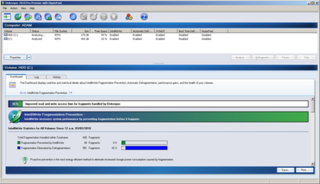ext3, or third extended filesystem, is a journaled file system that is commonly used by the Linux kernel. It used to be the default file system for many popular Linux distributions. Stephen Tweedie first revealed that he was working on extending ext2 in Journaling the Linux ext2fs Filesystem in a 1998 paper, and later in a February 1999 kernel mailing list posting. The filesystem was merged with the mainline Linux kernel in November 2001 from 2.4.15 onward. Its main advantage over ext2 is journaling, which improves reliability and eliminates the need to check the file system after an unclean shutdown. Its successor is ext4.
The Smart File System (SFS) is a journaling filesystem used on Amiga computers and AmigaOS-derived operating systems. It is designed for performance, scalability and integrity, offering improvements over standard Amiga filesystems as well as some special or unique features.
PageDefrag is a program, developed by Sysinternals, for Microsoft Windows that runs at start-up to defragment the virtual memory page file, the registry files and the Event Viewer's logs.

Diskeeper is a defragmentation program designed for Microsoft Windows. It was developed by Executive Software International, Inc., which later changed its name to Diskeeper Corporation, and is now called Condusiv Technologies.
A registry cleaner is a class of third party software utility designed for the Microsoft Windows operating system, whose purpose is to remove redundant items from the Windows registry.
Database tuning describes a group of activities used to optimize and homogenize the performance of a database. It usually overlaps with query tuning, but refers to design of the database files, selection of the database management system (DBMS) application, and configuration of the database's environment.

Disk Defragmenter is a utility in Microsoft Windows designed to increase access speed by rearranging files stored on a disk to occupy contiguous storage locations, a technique called defragmentation. Defragmenting a disk minimizes head travel, which reduces the time it takes to read files from and write files to the disk. Beginning with Windows XP, Disk Defragmenter also reduces system startup times.
Contig is a command line defragmentation utility for Windows currently owned by Microsoft subsidiary SysInternals.

In computing, file system fragmentation, sometimes called file system aging, is the tendency of a file system to lay out the contents of files non-continuously to allow in-place modification of their contents. It is a special case of data fragmentation. File system fragmentation increases disk head movement or seek time, which are known to hinder throughput. In addition, file systems cannot sustain unlimited fragmentation. The correction to existing fragmentation is to reorganize files and free space back into contiguous areas, a process called defragmentation.
Condusiv Technologies is a software company based in Burbank, California. The company was formerly known as Diskeeper Corporation, a name derived from its flagship product, Diskeeper, a file-system defragmentation software package for Microsoft Windows and OpenVMS. Before adopting the Diskeeper name, the company was known as Executive Software International, Inc.

O&O Defrag is a Windows defragmentation utility sold by German software developer O&O Software. It has won several awards by PC journals and magazines, and is certified by Microsoft for all its current NTFS-based operating systems, including Windows 2000, Server 2003, Vista, 7, and 10.

Vopt is a Windows defragmentation utility sold by Golden Bow Systems. It is one of the oldest defragmentation products, and has supported MS-DOS and all versions of Microsoft Windows. The convenience of quick processing time is offset by less optimal performance, but when used in conjunction with the built-in optimization of the Windows prefetch folder, system performance is maintained without major reorganization of all the files on the drive. In
February 2016, the registration key is released free in accordance with the author Barry Emerson's wish.

Defraggler is a freemium defragmentation utility developed by Piriform, which can defragment individual files or groups of files on computer system. Defraggler runs on Microsoft Windows; it has support for all versions since Windows XP. It includes support for both IA-32 and x64 versions of these operating systems.

UltraDefrag is a disk defragmentation utility for Microsoft Windows. Prior to version 8.0.0 it was released under the GNU General Public License. The only other Windows-based defragmentation utility licensed under the GNU GPL was JkDefrag, discontinued in 2008.

JkDefrag is a free open-source disk defragmenting utility computer program for Windows. It was developed by Jeroen Kessels beginning in 2004 and is released under the GNU General Public License. The "Jk" part of the utility name is taken from the developer's name, Jeroen Kessels. In 2008, from version 4, much changed from previous versions; JkDefrag was renamed MyDefrag by its developer, and JkDefrag was discontinued, although still available. MyDefrag is closed source freeware. MyDefrag website is defunct as of 2016. The JKdefrag website is still active, but all download files have been removed.
UltimateDefrag is a retail file-system defragmentation utility made by DiskTrix. An older version of the program is available as the UltimateDefrag Freeware Edition.
Auslogics Disk Defrag is a freemium software application for Microsoft Windows intended to defragment files and folders on a hard drive, consolidate free space and optimize file placement using different criteria. It is available in both a free and a proprietary "Pro" version with extended functionality.
PerfectDisk is a defragmentation software product for Windows developed by Raxco.





